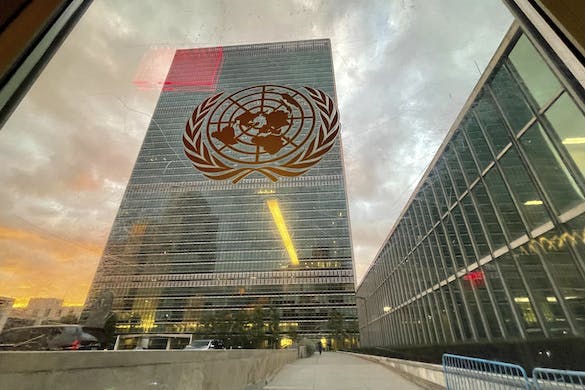Biden Emerges as Last Believer in Multilateralism, as Other Key Leaders Skip the Annual UN General Assembly
The heads of the other four Security Council members will, for the first time as a group, skip the opening of the General Assembly session.

Is President Biden the world’s last believer in multilateralism? Next week he, alone among the UN’s elite members, will attend Turtle Bay’s annual gabfest.
Beside America, the permanent members of the Security Council, which is the United Nations’s most powerful body, are Russia, Communist China, Britain, and France. Their leaders — President Putin, Chairman Xi, Prime Minister Sunak, and President Macron, respectively — will, for the first time as a group, skip the opening of the General Assembly session.
Messrs. Putin and Xi rarely travel for the September opening of the UN General Assembly general debate, which draws world leaders and their noisy, siren-laden motorcades to New York’s busy streets. Russia once wielded more power at the UN than its nominal weight in world affairs. Now Mr. Putin is shunned there.
Mr. Xi, meanwhile, is more interested in placing Chinese operatives at top UN positions than in personal appearances at public global affairs. While Messrs. Sunak and Macron are true internationalists, political and other pressures are keeping them at home.
Beyond speechifying, Mr. Biden may soon need to address a UN paradox. His ambassador there, Linda Thomas-Greenfield, often says that by buying Iranian drones, Russia is violating the Security Council resolution that endorsed the Iran nuclear deal of 2015. The ban, though, is due to expire by the end of October, as part of the resolution’s “sunsets.”
Unless Mr. Biden cancels his favored 2015 Iran deal by triggering the resolution’s “snapback” mechanism, Iran will be able to legally sell and buy missiles and drones to its heart’s content. The dilemma exposes a tension between the White House’s oft-expressed fondness for multilateralist solutions and its declared hope for a win in Ukraine.
There are other top guests to follow Mr. Biden next week:
President Zelensky: The Ukrainian war leader will be feted by allies and snubbed by the likes of a veteran UN voice, Foreign Minister Sergey Lavrov of Russia. Following a triumphant UN return, the T-shirt-clad Mr. Zelensky is expected at Washington for White House and Capitol Hill visits. He will shore up some congressional support for Ukraine, but his drop-ins are no substitute for an overdue prime-time address to the nation by Mr. Biden during which the president explains why a war victory in Europe is an American interest.
President Raisi: The Islamic Republic’s president, nicknamed “the Tehran butcher” for his role in ordering mass executions in the late 1980s, will arrive at Turtle Bay on a fateful anniversary. A year ago this Saturday, 22-year-old Mahsa Amini died in custody after the regime’s “morality police” arrested her for wrongfully donning the mandatory head covering. After anti-hijab protests ensued, they were brutally suppressed by the regime.
Regime thugs will try this weekend and beyond to prevent the revival of nationwide demonstrations. At New York, meanwhile, Mr. Raisi is expected to meet for polite conversations with at least three American groups, including the venerated Council on Foreign Relations. Iranian protesters will jeer from First Avenue.
Prime Minister Netanyahu: Normally packing surprise rhetorical and visual gags in UN General Assembly speeches, the besieged Israeli premier may be a victim of gags this time. Unlike in years past, when protesters against him were Palestinians or Iranians, this time thousands of Israeli opponents of his government plan to disrupt his New York visit. They already came up with a novel trick, calling him a “crime minister” in slides projected on the UN building,
For a year, Mr. Biden has wielded a routine meeting with an elected Israeli premier as a cudgel against Mr. Netanyahu. Next week, he is expected to finally conduct a UNGA meet-and-greet with his Jerusalem counterpart. At the same time, he insists that Mr. Netanyahu nevertheless would be banned from visiting the White House. Mr. Biden is demanding major Israeli concessions to the Palestinians, even as he knows that the current ruling Israeli coalition will not make them.
Mr. Netanyahu is hoping to score one point with the White House with a reported meeting with Mr. Zelensky. Kyiv has been at odds with Jerusalem, long contending a lack of Israeli support in the war. A first meeting between the two Jewish leaders could remove some kinks from Ukrainian-Israeli relations.
President Abbas: Unpopular at home, where he barely hangs on to the Palestinian Authority’s seat of power at Ramallah’s Moqata, the aging man known as Abu Mazen is nevertheless always a welcome guest at Turtle Bay.
Although the de-facto Saudi ruler, Crown Prince Mohammed bin Salman, will be yet another UNGA absentee, Riyadh is reportedly organizing a mini-summit designed to revive the Israeli-Palestinian peace process. Progress is as unlikely as Mr. Biden’s hoped-for quick Saudi-Israeli peace treaty. Nevertheless, Mr. Abbas will get a precious late-in-life return to the limelight.
***
The UNGA rarely produces significant diplomatic breakthroughs, and this round of speeches is unlikely to be any different. Remarkably, the prestige of the UN and its sprawling, stagnant bureaucracy is declining so fast that even noted Western dignitaries now don’t think twice about skipping its most notable annual event.

